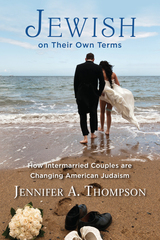
Interfaith marriage is a visible and often controversial part of American life--and one with a significant history. This is the first historical study of religious diversity in the home. Anne Rose draws a vivid picture of interfaith marriages over the century before World War I, their problems and their social consequences. She shows how mixed-faith families became agents of change in a culture moving toward pluralism.
Following them over several generations, Rose tracks the experiences of twenty-six interfaith families who recorded their thoughts and feelings in letters, journals, and memoirs. She examines the decisions husbands and wives made about religious commitment, their relationships with the extended families on both sides, and their convictions. These couples--who came from strong Protestant, Catholic, and Jewish backgrounds--did not turn away from religion but made personalized adjustments in religious observance. Increasingly, the author notes, women took charge of religion in the home. Rose's family-centered look at private religious decisions and practice gives new insight on American society in a period when it was becoming more open, more diverse, and less community-bound.

Over half of all American Jewish children are being raised by intermarried parents. This demographic group will have a tremendous impact on American Judaism as it is lived and practiced in the coming decades. To date, however, in both academic studies about Judaism and in the popular imagination, such children and their parents remain marginal.
Jennifer A. Thompson takes a different approach. In Jewish on Their Own Terms, she tells the stories of intermarried couples, the rabbis and other Jewish educators who work with them, and the conflicting public conversations about intermarriage among American Jews. Thompson notes that in the dominant Jewish cultural narrative, intermarriage symbolizes individualism and assimilation. Talking about intermarriage allows American Jews to discuss their anxieties about remaining distinctively Jewish despite their success in assimilating into American culture.
In contrast, Thompson uses ethnography to describe the compelling concerns of all of these parties and places their anxieties firmly within the context of American religious culture and morality. She explains how American and traditional Jewish gender roles converge to put non-Jewish women in charge of raising Jewish children. Interfaith couples are like other Americans in often harboring contradictory notions of individual autonomy, universal religious truths, and obligations to family and history.
Focusing on the lived experiences of these families, Jewish on Their OwnTerms provides a complex and insightful portrait of intermarried couples and the new forms of American Judaism that they are constructing.
READERS
Browse our collection.
PUBLISHERS
See BiblioVault's publisher services.
STUDENT SERVICES
Files for college accessibility offices.
UChicago Accessibility Resources
home | accessibility | search | about | contact us
BiblioVault ® 2001 - 2024
The University of Chicago Press









